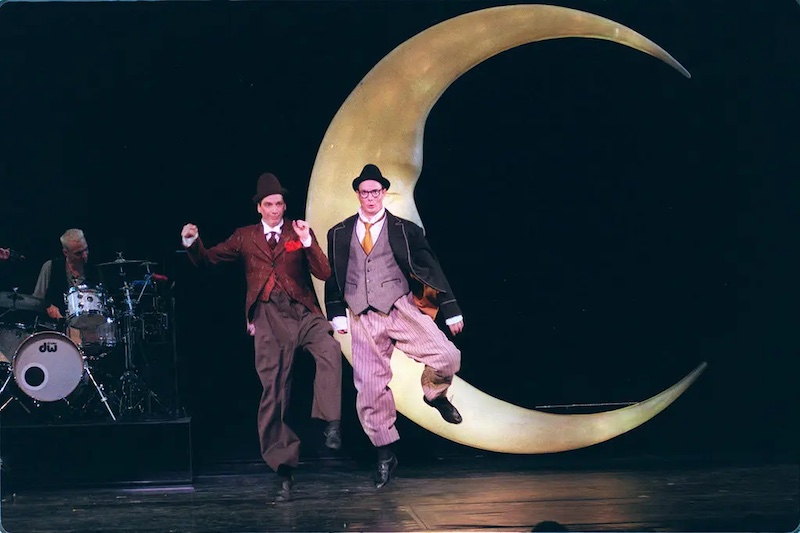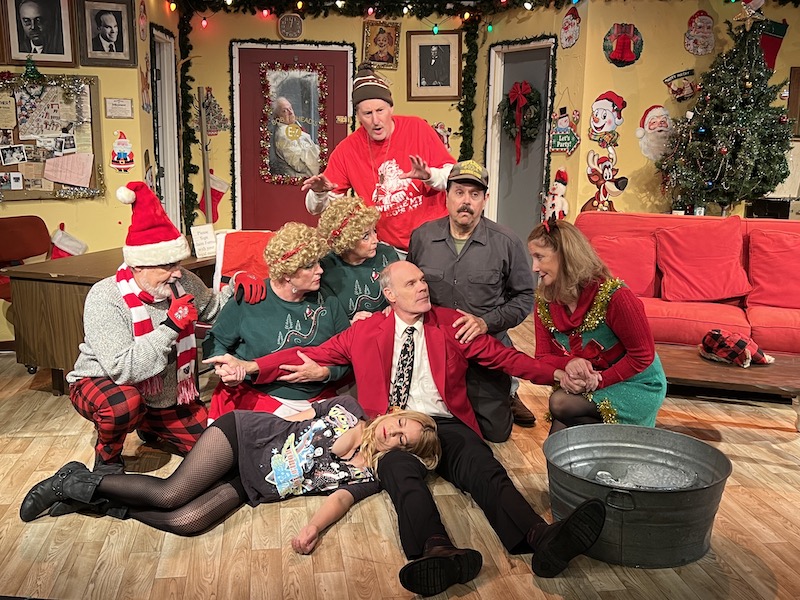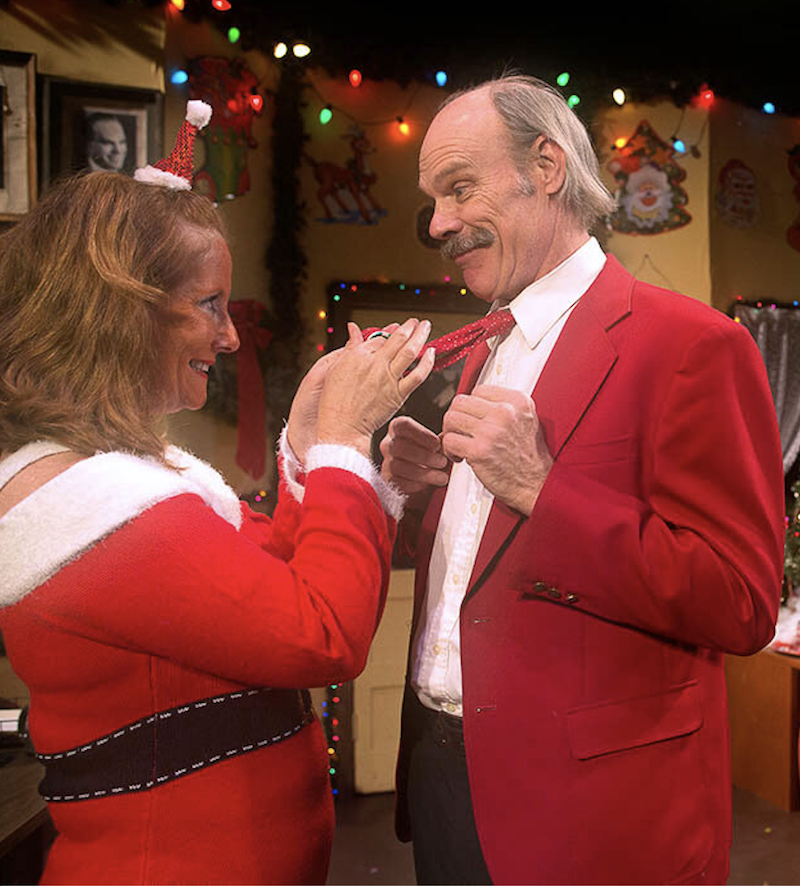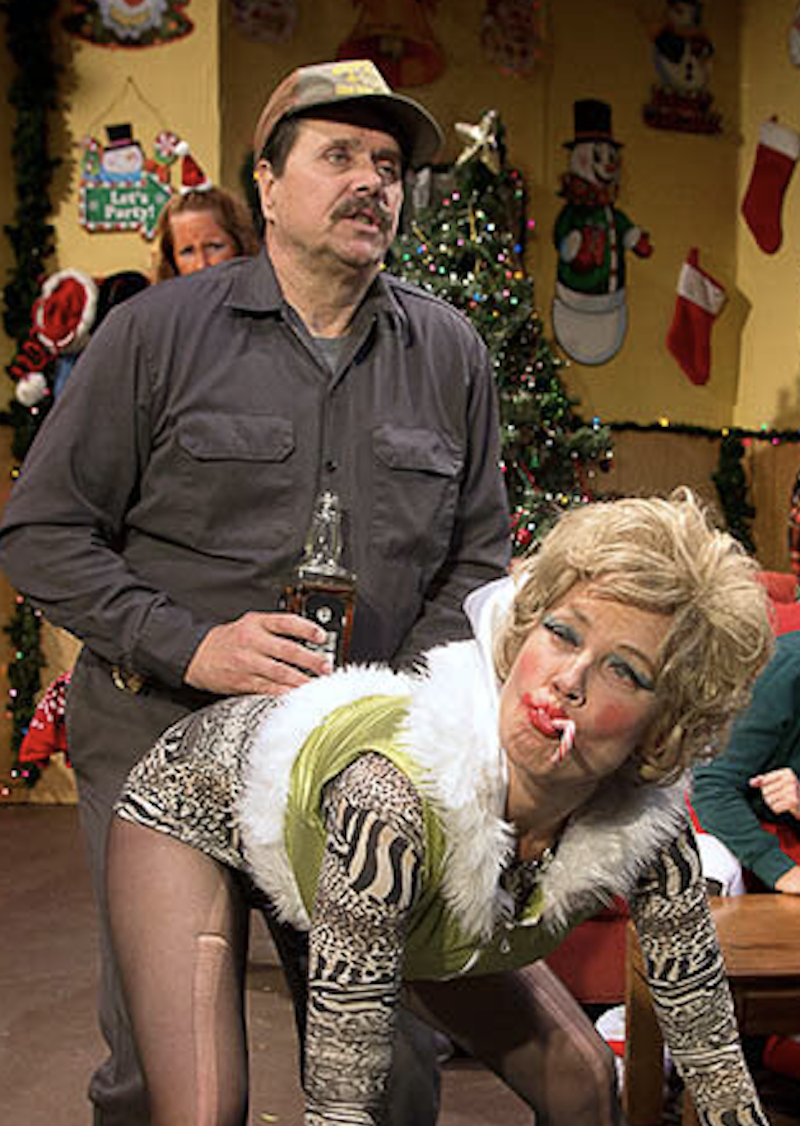
L-R: Front Chloe Taylor, Rob Elk, Andrea Hutchman; Rear: Pat Towne, Johanna McKay, Judy Heneghan, Mark Fite, Joe Keyes, and Peter Breitmayer at door. (Photo by Louisa Gauerke)
A Display of Pointless Lunacy Finds Its Point
By Steven Leigh Morris
Joe Keyes and Rob Elk concocted a mostly scripted, partly improvised, lunatic holiday extravaganza, Bob’s Holiday Office Party, that’s been playing annually for 26 years at various locations across the Southland. I reviewed it for LA Weekly 16 years ago in 2007 (when the show was 12 years old). It was, and remains, an annual pageant like A Christmas Carol, but without a moral, without an iota of sentimentality or even romanticism. Rather, it traffics in mockery. Beer and hard booze flow through this cartoon in rivers, as does untethered sexuality, scatology, and ribald physical humor. This is part ancient Roman comedy, part commedia, and part clown show, as filtered through the 1970s sitcom aesthetic of the Carol Burnett Show and the Bob Newhart Show.
Set in the tiny town of Neuterburg, Iowa, it tracks the drug-liquor-sex-laced comings and goings of the denizens who happen to be clients of centerpiece Bob Finhead’s insurance company. Finhead (Elk) followed in the footsteps of his father and grandfather, selling insurance. Both died at their desks while “filling out a crop damage report.” Bob, however, has a fantasy of breaking that mold, and dreams of new life in the big city (Des Moines) as an inventor.
“You wanna borrow my shotgun,” Sherriff Joe (Keyes) offers?
“What for?” Finhead replies.
“To kill that dream, once and for all.”
This is a town where, as the saying goes, you can leave all your ambitions behind. These people are glued to each other and to their collective insanity, and there’s almost no escape. One exception is a character named Elwin Bewee (J. P. Manoux), notoriously bullied and beaten up throughout his childhood in Neuterburg. He was strung up in the high school gymnasium for the crime of being “non-Christian.” This treatment created in him asthma, chronic acne, a stutter, and irritable bowel syndrome. All of these cleared up the moment he left Neuterburg. He returns as a millionaire, out for revenge on his tormentors. The Merchant of Venice anyone?
But something profound has changed in 16 years, though less to this extended sketch comedy than to the nation in which it’s housed. In 2007, it was an amiable if insane depiction of small- town America. In its earlier years, the bullying of Elwin would have seemed an idiosyncrasy rather than the raging manifestation of tribalism that exists today. In the earlier years, the Johnson triplets (now the Johnson twins) laughed insanely at Elwin’s suggestion that climate change was real. In the 2023 version, the twins (Judy Heheghan and Johanna McKay) have devolved into Trump voters who attend QAnon meetings. “Oh, that sleepy Joe Biden” and his “Biden crime family,” they opine, belittling the Presidents “radical, socialist, communist agenda,” and his “crackhead son,” and are thrilled that he’s being investigated by that “House Committee on all things Biden.”
These script developments are part of a logical evolution of these characters, but what has changed in the United States, not to mention the world, is far more extreme.
We stand at the precipice of “electing” an unapologetic dictator to lead the country, a man who explicitly tells us of his plans to use the military to crush domestic political protests (against him), and to use the Justice Department to prosecute his opponents. The New York Times is reporting that the legal restraints on his oft-stated plans for autocratic revenge, should he regain power, are feeble.
America’s most viewed source of political satire, Saturday Night Live, lives down to the complaint that political satire can’t compete with the political circus that exists in reality. SNL goes after figures such as Donald Trump and George Santos and Kevin McCarthy. Not only can such satires not compete with reality, but they’re also missing the point. These figureheads whom they’re mimicking are symptoms of a deeper problem, which Bob’s Holiday Office Party has in its crosshairs: the 33% of the population who favor a dictatorship over a democracy. These are the residents of Neuterburg, Iowa, whom co-writer Keyes once defended in an interview as being confused, but not evil.
I’m not so sure. When dopehead Marty (Mark Fite) keeps tormenting Carol (Sirena Irwin), recently released from the local asylum, he doesn’t strike me as confused but willfully sadistic. Through the lens of 2023, the target of this joke is not Carol’s mental/emotional dysfunction but Marty’s cruelty, a stand-in for the kind of tribal bullying, segueing into violence, now permeating out culture. That Elwin was strung up in the gymnasium, essentially for being Jewish (though that word doesn’t exist in the text, it’s implicit), this play has delivered a full-throttle satirical canon ball, less funny than it is chilling. Its proponents can say all they want that this show is a comedic diversion, I’m not buying it.
Whether or not the creators know it, the show hasn’t found the cultural moment that gives it a deeper purpose; rather, the cultural moment has found this show. For me, that development elevates Bob’s Holiday Office Party into something approaching brilliance.
Due to gerrymandering — which, perversely, gives the people of Iowa six times more political weight than the people of California or New York — the residents of Neuterburg, and all the burgs across small-town America, have the capacity to do incalculable damage to the rest of us. They can bully the rest of us into submission. And that’s no laughing matter.
This is the situation that this show depicts, all the while targeting these people through unrelenting parody and satire of their often clueless hypocrisies, which renders Bob’s Holiday Office Party a legacy of Moliére. It’s also a reminder of why theater at its best, which this show is, can serve the purposes of dissent and enlightenment without a single lecture being delivered. And it does all this while the audience is folded over in paroxysms of laughter. I’ve not seen this on TV lately. The energy in the room. Each actor’s first entrance being met with bursts of applause, in recognition of prior year’s performances in this same show. This is the stuff for which the theater was invented.

David Shiner and Bill Irwin in “Fool Moon” on Broadway, 1998 (Photo by Sara Krulwich/The New York Times)
In the wake of the Northridge earthquake in 1994, two clowns, Bill Irwin and David Shiner, rolled into what was then the James A. Doolittle Theatre on Vine Street (now the Ricardo Montalban Theatre), where they performed their clown show Fool Moon, which would appear on Broadway four years later). In a kind of prelude, one of them played the role of an audience member who couldn’t find his seat, and so he climbed across patrons in one row, groping faces, trying to avoid stepping on toes, at one point climbing along the tops of seats, until he arrived at his seat, or what he thought was his seat. It was occupied. He stared at his ticket stub, slapped his forehead in a gesture of realization that he was in the wrong row, and so he clambered back, repeating his rude trek in reverse, before doing the same thing in the next row forward.
I recall one of the clowns in a corner of the large stage, running forward until, as though restrained by an invisible bungee cord, he was throttled backwards, before a retry.
This clown show pushed buttons in its audience I’d never before seen. It was staged in the context of an earthquake, and a pretty big one, that had just occurred — a situation that rendered dubious simply getting through the day without some cosmic interference. Windows had been shattered down Vine Street from the sheer force of nature. And these clowns, without words, depicted with a kind of balletic mastery the absurdity of imagining we can control pretty much anything around us. The physical comedy was just what the doctor ordered, the clown show equivalent of an amusement park ride in which we face death eyeball to eyeball, and can laugh. Must laugh.
If there was a point to any of this, it’s that we have so little control of events around us. We imagine we’re in control, as though power is our destiny when, in fact, we’re at the mercy of physics, and gravity, and, in the case of Bob’s Holiday Christmas Party, our own collective stupidity.
For those of us who actually believe that free speech, free choice, and that rudimentary principles of democracy actually matter, what we’re facing in the next election cycle is something akin to the dread of an earthquake. And the impact of the physical comedy in Bob’s Holiday Christmas Party serves much the same therapeutic purpose, perhaps because it’s so perfectly executed by artists who have, obviously, been doing this for decades.
In the opening scene, Keyes’s Sheriff Joe bursts in (early for the party), to Bob Finhead’s Christmas-decorated office (set design by Amanda Knehans). Joe sees that the door to the bathroom “still hasn’t been fixed” (it’s off its hinges), so, in view of the audience, he drops his pants, and sits on the throne, while continuing a slightly unhinged monologue about what’s going in about town. Bob tries to tell him that guests could be arriving at any moment, but Joe doesn’t care. He grunts mid-sentence, grabs a wad of toilet paper with panache. Need I say more. It’s all so blithe. There’s no running water, so Joe washes his hands with the ice from the ice chest. Meanwhile, Elk is channeling Bob Newhart with eye movements to transmit his discomfort.
For a sense of this scene’s stylistic origins, take a look at this clip from The Bob Newhart Show, of Newhart interviewing a book show author (whose book he hasn’t had time to read), and his facial expressions as the author reveals his discomfiting agenda.
Sheriff Joe rattles on about “foreigners” working at the nearby big box store. His treatise makes no sense, which Bob points out.
“What the hell are you talking about?” Bob askes him.
“I really don’t know,” Joe replies. “That’s a problem, but I’m committed to it.”
Yep. That’s our world, in a nutshell.
Later in the play, Sheriff Joe finds himself wrapped in the arms of the twins, slow dancing, and then dry humping in unison, while Joe’s eyes dart about, revealing some combination of arousal and panic.
There’s a story thread of the town mayor (Pat Towne) neglecting his wife, Marjorie (Andrea Hutchman), whose orange face speaks of too much time at the tanning salon. He boasts that he’s approaching six-days sober, eliciting a round of polite applause from everyone in the room. When the party-goers are thoroughly intoxicated, sloshing their way across the room in groupings and gropings, the mayor announces proudly that he’s gay. It’s his triumphant coming-out moment. “I’m gay!” he repeats. Nobody is paying attention. Nobody cares. There goes gender politics flushed down the toilet.
Late in the play, town tart Brandi (Sirena Irwin, returning after her cameo as barely-recovered from-the-asylum Carol) shows up in torn stockings (of course) and a micro skirt. Her lips are smeared with red, while she sucks on a peppermint candy cane that slowly gyrates in and out of her mouth. It’s a total commedia trope, which Irwin masters. Brandi, too, has eyes for Sheriff Joe, and her seduction of him is both slow and unrelenting, partly because she’s out of her mind. Her performance here is largely what brought back memories of Bill Irwin and David Shiner, though it actually channels Carol Burnett. It’s as though her limbs have a will of their own, detached from her mind, as they wrap themselves around Sheriff Joe in sexually provocative contortions, leaving him boggle-eyed.
You might say to yourself: No, she’s not going to do that. She can’t do that. She couldn’t do that. She wouldn’tdo that. Oh my God, she just did that. It’s like a car crash that you swear you shouldn’t watch but you can’t avert your eyes. Her crotch winds up in Elwin’s face, leaving him screaming and grasping for his asthma inhaler.
Irwin’s father is a Stanford University physicist; in her glorious performance, his daughter defies the laws of physics.
There aren’t many ensembles that carry on their backs and in their bones so much craft. In so many shows, one looks at the actors and imagines, “I can do that.” Not here. These are LA’s thoroughbreds of comedy. Their experience blazes on this stage, thanks also to Matt Roth’s direction that makes solid designs from chaos, so perfect that the designs barely show.
I drove two and half hours in each direction to attend this performance. I don’t regret a single minute.
BOB’S HOLIDAY OFFICE PARTY Beverly Hills Playhouse, 254 South Robertson Blvd. Beverly Hills. Fri.-Sat., 8 pm, Sun., 7 pm; thru Dec. 17. www.onstage411.com/BHOP

















